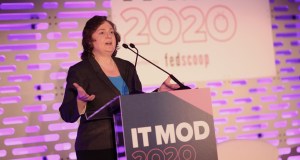 President Barack Obama (left) and National Intelligence Director James Clapper (middle) (File photo: Pete Souza/White House)
President Barack Obama (left) and National Intelligence Director James Clapper (middle) (File photo: Pete Souza/White House)President Barack Obama today announced significant changes to the controversial data collection programs run by the National Security Agency, calling for an end to the government’s storage of Americans’ telephone metadata and requiring the government to first obtain court orders before gaining access to the data.
Speaking to the nation from the Justice Department, Obama embraced the majority of the 46 recommendations made by his handpicked NSA review board, which issued its final report Dec. 18. The president argued firmly the programs remain critical to U.S. national security and to the safety of Americans, and refused to apologize to foreign countries that have “feigned surprise” about the existence of U.S. intelligence collection. He also ordered the end to targeted eavesdropping on the leaders of allied countries personal communications absent a valid national security concern.
Obama said the U.S. only leverages its very powerful signals intelligence capabilities for “counterintelligence, counterterrorism, counterproliferation, force protection and combating transnational crime, including sanctions evasion.”
Calling for a “two-step transition,” Obama ordered Attorney General Eric Holder Jr. and Director of National Intelligence James Clapper to deliver a plan that “will end the … bulk metadata program as it currently exists and establish a mechanism that preserves the capabilities we need without the government holding this bulk metadata.” Obama said he wants the plan before March 28, when the programs come up for reauthorization.
“Effective immediately, we will only pursue phone calls that are two steps removed from a number associated with a terrorist organization instead of three,” Obama said, referring to the first step in his two-step transition plan. “And I have directed the attorney general to work with the Foreign Intelligence Surveillance Court so that during this transition period, the database can be queried only after a judicial finding, or in a true emergency.”
The second step in the transition would involve finding alternatives for storing the metadata in a nongovernmental entity.
In addition to calling for the creation of a panel of public advocates to represent the privacy interests of Americans on the secret FISA court, Obama directed the attorney general to develop new procedures that will increase the transparency of National Security Letters issued to private companies when the government seeks access to user data. The president also asked Holder to develop procedures that would allow private companies subject to NSLs to release information about the requests after a certain period of time. Current policies place an indefinite gag order on the private sector.
Obama stood squarely behind NSA and the intelligence community, characterizing NSA’s electronic eavesdropping capabilities as critical to preventing future terrorist attacks, and noted it was the American people and Congress who “demanded that our intelligence community improve its capabilities and that law enforcement change practices to focus more on preventing attacks before they happen than prosecuting terrorists after an attack.”
The president also made it clear he would not “apologize” to the rest of the world for the efficacy of the U.S. intelligence community or for the need to collect intelligence.
“Everyone who has looked at these problems, including skeptics of existing programs, recognizes that we have real enemies and threats and that intelligence serves a vital role in confronting them,” Obama said. “We cannot prevent terrorist attacks or cyber-threats without some capability to penetrate digital communications, whether it’s to unravel a terrorist plot, to intercept malware that targets a stock exchange, to make sure air traffic control systems are not compromised or to ensure that hackers do not empty your bank accounts. We are expected to protect the American people; that requires us to have capabilities in this field.”




